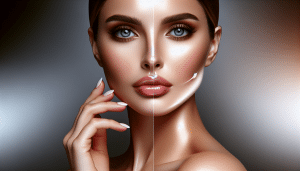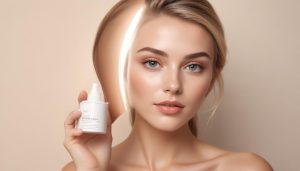Discover Radiant Skin Secrets for Wellness You Crave
Ella Knight August 31, 2025
Unlock the journey to glowing skin by exploring the science, rituals, and real-world benefits proven to enhance radiance and well-being. This practical guide on skin hydration, natural ingredients, anti-aging routines, and holistic approaches empowers anyone curious about cultivating true beauty from within.
Why Skin Hydration Changes Everything
Daily skin hydration is foundational for keeping your complexion fresh, supple, and resilient against environmental stressors. Skin, being the body’s largest organ, thrives when moisture is maintained, helping to protect its delicate barrier and minimize the appearance of fine lines and dryness. Many people underestimate how proper hydration influences both the tactile feel and visual glow of their skin. It’s not just about drinking water—moisture balance involves ingredients like hyaluronic acid and ceramides that prevent transepidermal water loss while locking in comfort throughout the day.
Hydrated skin is less prone to irritation, flaking, and dullness, enabling you to enjoy a more comfortable experience and even makeup application. Science also supports that moisture-rich skin can better recover from minor wounds or blemishes. The natural lipid barrier, supported by moisturizers, acts as a shield against pollutants and irritants that can otherwise trigger redness or acne. Choosing products labeled as ‘non-comedogenic’ ensures that skin remains clear without clogged pores.
Adequate hydration routines cater to all skin types and all ages. Those with oily complexions can still benefit, as dehydration may actually prompt the skin to produce more sebum. Sensitive skin types notice fewer flare-ups when moisture is consistently present. For best results, habits such as daily gentle cleansing, using a humectant serum, and sealing with an emollient cream are widely recommended (Source: https://www.aad.org/public/everyday-care/skin-care-secrets/routine/building-your-routine).
The Power of Natural Skin Care Ingredients
Natural ingredients in beauty routines offer gentle alternatives that harmonize with the skin’s biology. Antioxidant-rich botanicals, like green tea and chamomile, help defend skin from oxidative stress, a leading cause of premature aging. Ingredients such as aloe vera and calendula are known for soothing sensitive areas and calming inflammation. These natural boosters are sometimes used to enhance hydration, brighten uneven tone, and provide nutrients directly into the skin’s upper layers.
Interest in plant-based oils—like jojoba, argan, and squalane—continues to grow for their emollient and barrier-strengthening properties. The gentle nature of these natural oils makes them suitable for nearly all skin types, and they are especially loved by those with reactive or allergy-prone skin. Botanical ingredients often contain fatty acids and vitamins that feed the skin and contribute to an overall healthier appearance without the use of synthetic fragrance or preservatives.
For anyone concerned with what touches their body, transparency in ingredient sourcing becomes crucial. Many reputable brands now list both the botanical origin and the extraction process, allowing consumers to make empowered, informed decisions. Always patch-test new botanicals since plant extracts can sometimes cause unintended reactions in sensitive individuals. Learning how nature and science blend in modern wellness is key to building a skincare routine that fosters long-term radiance (Source: https://www.nccih.nih.gov/health/skin-care-products).
Smart Anti-Aging Strategies for Healthy Glow
Anti-aging routines are not about reversing time but about maintaining vitality as skin matures. Retinoids, vitamin C, and peptides are among the most researched ingredients for supporting collagen production and reducing the look of wrinkles. Using sunscreen daily is a primary method recommended by dermatologists to prevent UV damage, which accelerates signs of aging such as spots and loss of elasticity.
Once into your 30s and beyond, collagen and elastin naturally decline, yet lifestyle habits can help slow this process. Consistent sleep, balanced nutrition, and protection from harsh weather all contribute to youthful, supple skin. Avoiding smoking and excess alcohol further supports the skin’s ability to repair itself. By combining targeted serums with gentle exfoliation, you create an environment in which new, healthy cells thrive.
Scientific evidence suggests that multi-step skincare approaches yield gradual but visible improvement, supporting tone, texture, and overall radiance. This does not mean a complicated routine—consistency and adjustment to one’s changing needs are what truly count. Building your anti-aging arsenal might seem overwhelming, but well-structured guidance removes the guesswork, allowing confidence and enjoyment in self-care (Source: https://www.cdc.gov/aging/publications/features/skincare-older-adults.html).
Radiance from Within: Lifestyle & Nutrition
Radiant skin is often a reflection of internal well-being supported through mindful lifestyle choices. Hydration, sleep, and a nutrient-dense diet full of antioxidants and omega-3 fatty acids all play roles in maintaining a luminous complexion. Leafy greens, colorful berries, and seafood supply vital nutrients, which assist the skin’s ability to regenerate and protect against daily stressors.
Nutritionists highlight that vitamin C, E, and zinc are essential in the biosynthesis of collagen and in repairing skin damage. Even mild dehydration can manifest as dull, tired skin, so mindful water intake matters. For those with dietary restrictions, supplements—used under supervision—can bridge gaps in nutritional intake, contributing to longer-lasting skin resilience and glow.
Movement is equally important. Moderate, regular exercise increases circulation, helping carry nutrients and oxygen to skin tissues. The resulting post-workout flush is a sign of that healthy boost, and those who stay active often report smoother, softer skin over time. Choosing wellness rituals that nourish both body and spirit elevates your natural radiance (Source: https://www.hsph.harvard.edu/nutritionsource/skin-health/).
Mindfulness and Stress Reduction for Beauty
Stress has a well-documented impact on skin—triggering outbreaks, redness, or even premature aging through hormonal fluctuations. Studies have shown that stress signals can increase the production of sebum, leading to clogged pores and heightened sensitivity. Practicing techniques such as meditation, deep breathing, and gentle yoga helps mediate the body’s stress response and can indirectly benefit complexion clarity and texture.
People drawn to skincare often find complementary practices—like aromatherapy, journaling, or guided visualization—offer daily calm and cultivate a holistic sense of well-being. When stress is managed and sleep improves, skin has more time to repair, leading to fewer flare-ups and a brighter tone. Mindfulness means not just what you put on your skin, but how you perceive and nurture yourself emotionally, creating beauty that comes from a place of balance.
Creating mindful self-care routines fosters habits that anchor you in the present while building compassion for yourself and your body’s unique needs. Whether that’s dedicating a few minutes each day to mindful cleansing or embracing progressive muscle relaxation before bed, these rituals can yield transformative changes—inside and out (Source: https://www.psychology.org.au/for-the-public/psychology-topics/health-psychology/stress-and-your-skin).
Personalizing Your Skincare Rituals
There is no universal template for skincare success—personalization is key. Factors such as genetics, climate, age, and even daily routines influence how different products and habits perform. Skincare goals may shift with the seasons, hormonal changes, or lifestyle adjustments, making regular reassessment valuable. Tracking visible results and noting how your skin feels can refine choices over time.
Seeking professional advice, whether from board-certified dermatologists or registered estheticians, empowers informed decisions. Many professionals recommend patch-testing new products and incorporating one change at a time. This approach helps identify what supports your wellness and beauty best, preventing overwhelm or negative reactions. An evolving skin journey is more sustainable and satisfying with self-awareness guiding your approach.
Curiosity and experimentation allow you to discover what enhances your individual radiance naturally. Embracing flexibility and patience lets wellness become a source of personal celebration. In the end, the most effective routines are those that suit your unique blend of needs and that evolve with you. Building rituals tailored to your skin ensures confidence all year round (Source: https://www.womenshealth.gov/a-z-topics/skin-care).
References
1. American Academy of Dermatology. (n.d.). Building your skin care routine. Retrieved from https://www.aad.org/public/everyday-care/skin-care-secrets/routine/building-your-routine
2. National Center for Complementary and Integrative Health. (n.d.). Skin care products. Retrieved from https://www.nccih.nih.gov/health/skin-care-products
3. Centers for Disease Control and Prevention. (n.d.). Skin care and aging. Retrieved from https://www.cdc.gov/aging/publications/features/skincare-older-adults.html
4. Harvard T.H. Chan School of Public Health. (n.d.). The Nutrition Source: Skin health. Retrieved from https://www.hsph.harvard.edu/nutritionsource/skin-health/
5. Australian Psychological Society. (n.d.). Stress and your skin. Retrieved from https://www.psychology.org.au/for-the-public/psychology-topics/health-psychology/stress-and-your-skin
6. Office on Women’s Health, U.S. Department of Health & Human Services. (n.d.). Skin care. Retrieved from https://www.womenshealth.gov/a-z-topics/skin-care







